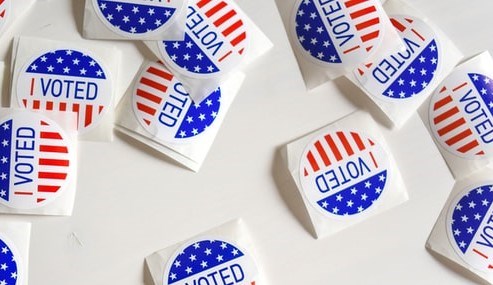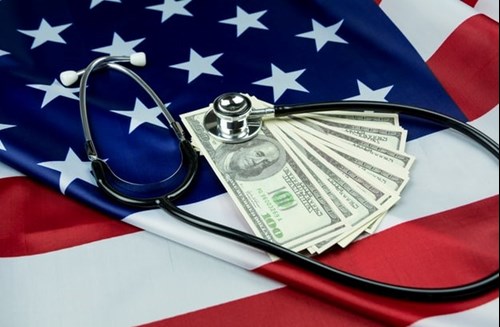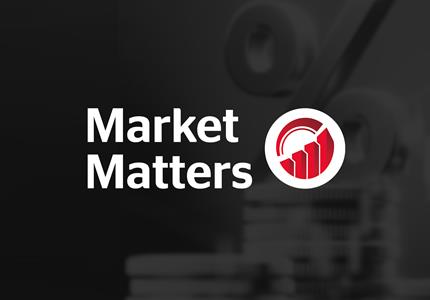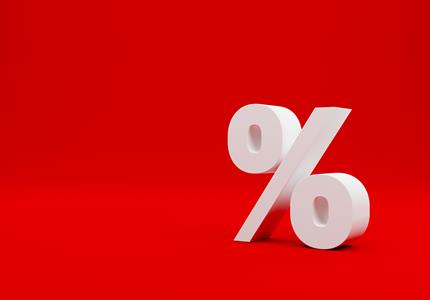

Boscher's Big Picture - US Election - Not quite the "Blue Wave" markets were expecting...
In his latest commentary, Kevin Boscher, chief investment officer at Ravenscroft, looks at the implications of the US election.

Once again the polls were wrong.
The US election’s widely expected “Blue Wave” appears to have floundered as the American electorate highlight just how divided the country really is. President Trump seems to have been buoyed by his handling of the economy and concerns over the Democratic shift to the “left”. At the time of writing (Thursday evening), we still don’t know the winner of the presidential election or which party will control the Senate. With Trump threatening to challenge the outcome, the legal wrangling and uncertainty could drag on for some time. He has already suggested that he will ask the Supreme Court to stop the contentious and late counts in several of the key swing states, where the margins are thin. A key thing to watch in the coming days is whether Trump will receive Republican backing for his proposed challenges.
The most likely outcome appears to be a narrow win for Joe Biden but with the Republicans retaining control of the Senate and making some modest gains in the House. This is arguably the best result for the US economy and financial markets, as evidenced by the reaction of stocks and bonds over recent days.
Should the Senate be split, then vice president Kamala Harris would have the tie-breaking vote, which would give the Democrats control of Congress too. However, even if this scenario prevails, Biden’s legislative agenda will be at the mercy of either the majority Republican Senate or their blocking filibuster tactic if they fail to win the majority. Other more moderate Democrats could also spoil the party. Hence, it is much less likely that Biden will be able to pursue his more progressive “green” infrastructure stimulus deal. It will also be much more difficult to pass many of his other favourite initiatives, including the proposed tax increases, changes to healthcare and increased regulation. Biden would need to try to negotiate with the Republicans via the budget reconciliation process and using his executive powers. Alternatively, he might need to move to outlaw the filibuster tactic, although this would probably be met with resistance and traditional Democrats in the Senate appear reluctant to change the rules.
Despite the uncertainty, I believe there is a good chance that a new fiscal package will be agreed before Inauguration Day next January, although the size of any deal is likely to be considerably smaller than the Democrats would like. Trump is unlikely to feel under pressure to push through the package during his lame duck session, which will last until late January. Having said that, with the electioneering out of the way, there will be less incentive for the Senate Republicans to block an aggressive fiscal stimulus and risk the wrath of voters should the recovery stall in the face of a surge in coronavirus across Europe and the US. Even if it is delayed beyond January, this would likely be partially offset by the reduced likelihood of any tax increases and any additional Fed easing.
In addition to wanting to open the fiscal floodgates, Biden will be able to apply a more rational cost-benefit analysis of Covid rather than dwelling exclusively on the risks. He, and the other Democratic leaders, will be even more desperate than Trump to engineer a powerful economic recovery during next year and beyond. They will remember the fate of Barack Obama who took too long to deliver an economic turnaround post the Great Financial Crisis, which allowed the Republicans to secure a landslide victory in the 2010 Congressional elections, thus resulting in a lame duck presidency for six of his eight years in office. A second priority for Biden will be healthcare and specifically expanding coverage of the Affordable Care Act, lowering the Medicare age threshold and a mental health reform package. A third target will be to introduce a democracy package and make it harder to supress the votes of racial minorities. None of this, however, will be easy given the political stalemate.

In the energy sector, Biden would like to immediately rejoin the Paris Accord and quickly start the green agenda via the infrastructure and stimulus package. He also favours implementing stringent standards for fracking and pipelines, together with the introduction of generous incentives for the expansion of wind and solar. On the banking and Treasury fronts, it will be interesting to see who is appointed as Treasury Secretary but the financial community can expect tougher regulation further down the road, although the Republicans will again resist this.

The election result could have a dramatic impact on the international front and public opinion outside of the US. Hostility towards China will persist given that one of the rare bipartisan issues is to counter China’s growing geopolitical, military and technological pre-eminence. Having said that, the Democrats are more likely to be focused on democracy and human rights although tariffs and other trade issues will remain on the agenda. Biden will also be more willing to use alliances to counter China geopolitically. A new US President with liberal, internationalist views and a policy of prioritising economic growth, fiscal spending and more globally co-ordinated action could persuade European and other global policymakers to follow suit.
From an economic viewpoint, the surge in Covid cases across Europe and the US with increasing restrictions being re-introduced, is an obvious cause for concern. Importantly, however, the current rebound in infections and the subsequent policy response bears little resemblance to the initial shock. The case fatality rates have stayed low during the current outbreak, which is an important difference from the first wave of infections back in March, when the world knew much less about the pandemic and reacted with panic and desperation. The policy implication of this is that no country appears willing to shut down the economy again given the better understood and more balanced views of the economic costs vs health risk arguments. In the meantime, it is likely that the Phase Three results of a number of potential vaccines, most notably from AstraZeneca, Pfizer and Moderna, will hopefully allow investors to start thinking about a post-Covid world.
Whilst the current virus surge and fiscal stimulus delay are threats to the economic recovery, there are grounds for optimism. US consumer spending remains strong, thanks to falling unemployment, fiscal and monetary support, increased savings and a housing boom. This would obviously be strengthened by any new government spending package, which would be targeted towards supporting employment and consumer demand.
The business sector also appears very resilient with earnings surprises heavily skewed to the upside, consistently solid confidence and small business sentiment readings and encouraging new business applications. Finally, the Fed is also playing a key role through its commitment to keeping interest rates extremely low across the yield curve and by ensuring the smooth functioning of credit markets through its purchase of corporate bonds, thus enabling businesses to borrow cheaply where needed.
From a market perspective, equities will likely stay volatile for a while longer but should be buoyed by the removal of the political uncertainty and improved prospects for additional fiscal stimulus in the not-too-distant future. Historically, “political gridlock“ has been bullish for stocks because a divided House and Congress reduces political interference and distortions of the economy with the Fed playing the dominant role in macro management. There is a risk, however, that this time is different as fiscal policy in the form of direct investment or spending is increasingly important alongside the very expansionary monetary policy in supporting the economic recovery. A slower emergence from the pandemic induced slump would not be good news for stocks in the short-term.

Having said that, it seems more likely that 2021 will be a year of stronger US and global economic growth than an extension of the Covid slump. Monetary and fiscal policy will remain exceptionally accommodative not just in the US but also globally. Although Biden’s proposed tax increases are potentially bad news for stock prices, it will be more difficult for him to enact these and his expansionary infrastructure and clean energy programs, if passed, should boost domestic demand, thus benefitting some sectors of the market. In addition, the dollar has weakened this year, which is equivalent to monetary easing and will boost exports and corporate profits from overseas markets. Biden’s victory will likely have an impact on the longer-term relative performance of certain sectors and market leadership may change. For example, infrastructure, renewable energy, biotech and managed care stocks should benefit whilst financials, big tech and pharma companies might struggle on the back of tighter regulation, should Biden successfully get this through.
Biden’s victory is unlikely to have a material impact on bond markets over the next few years. The background macro environment remains challenging as the global economy struggles to recover from the pandemic-induced shock at the same time as structural growth headwinds and disinflationary pressures dominate. This will force the Fed and other central banks to keep interest rates around current levels for many years to come and we will likely see additional QE and other measures, such as yield curve control or more explicit forward guidance, before this cycle ends. It will be essential that the Fed continues to fund any increased government (and corporate) spending at very low costs and this will necessitate low yields across the curve. Financial repression, whereby investors are forced up the risk curve in the search for yield, is very much intact.
It’s true that Biden’s policies, if implemented in full, would likely be more inflationary down the road due to the fact that a sustained public sector investment spree financed by the Fed will eventually result in significantly increased demand. However, the current crisis is a deflationary shock which will last for some time and inflation is unlikely to become an issue whilst the economy has so much spare capacity. In any case, the government and the Fed would welcome higher inflation at some point to boost nominal growth and help reduce the growing debt burden. It is more likely, however, that the dollar will continue to weaken over the next few years given the probable economic trajectory and subsequent policy response. This is especially the case given the increased spending plans of the Democrats, which implies bigger and more permanent fiscal and current account deficits.
In summary, there is a risk of uncertainty and additional market volatility over the coming days and weeks until the election outcome is determined, especially if we see civil unrest. However, investors can start to focus on the likely impact of the new administration on political and economic policy with a greater degree of visibility. The US economy is likely in a holding pattern until we get more clarity around the current Covid outbreak and likely timing of any fiscal boost. However, risks probably lie to the upside given the extraordinary monetary and fiscal support, the promise of more liquidity to come, a rapidly improving outlook for China and other Asian economies and the likely arrival of a vaccine in early 2021. Any potential threat from higher taxes should be more than offset by increased government spending, a weak dollar, dissaving and easing pandemic concerns. If the economy struggles as a result of either Covid-related restrictions or the lack of fiscal stimulus, then the Fed will likely step in with additional easing, just as the Bank of England have done this week. Markets are not out of the woods yet, but two of the key risks unsettling investors will soon start to fade away. Importantly, I believe the liquidity driven bull market is intact beyond the next month or so as investors look beyond the current economic dip to better times ahead.


